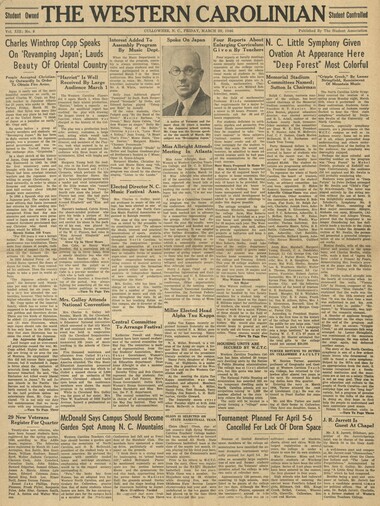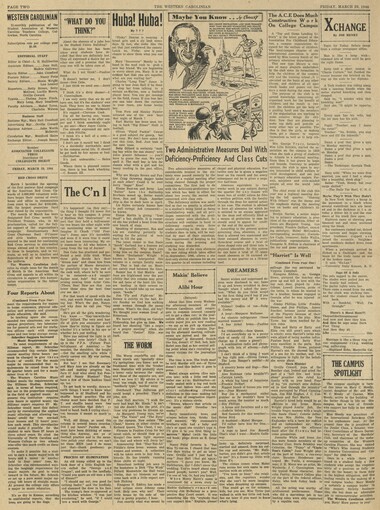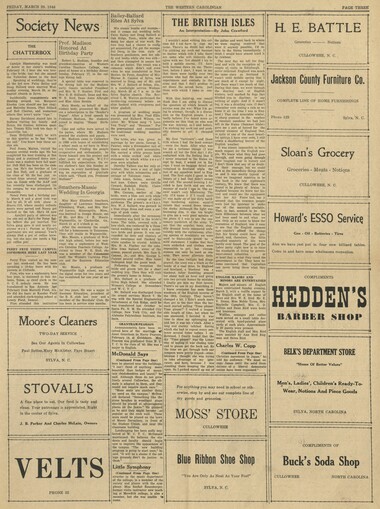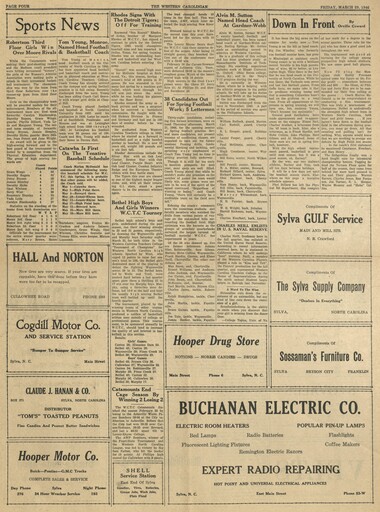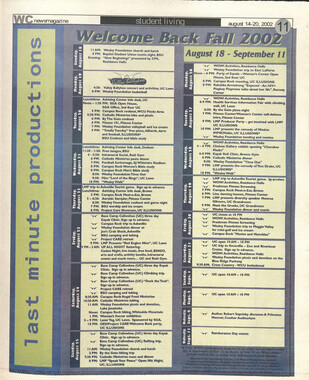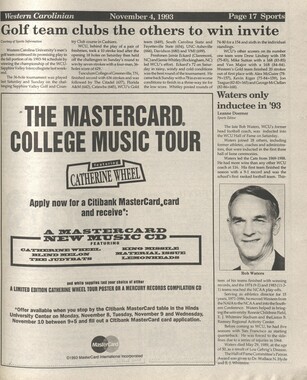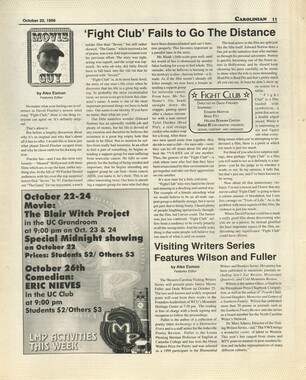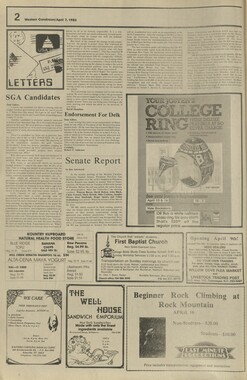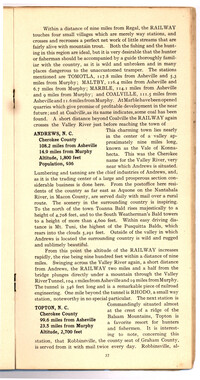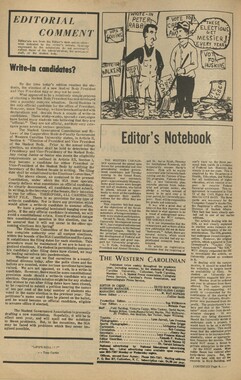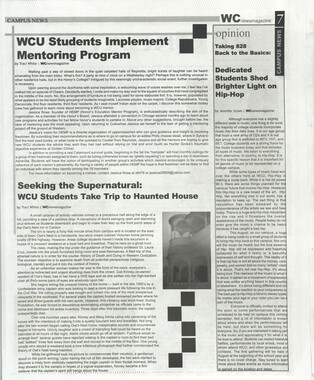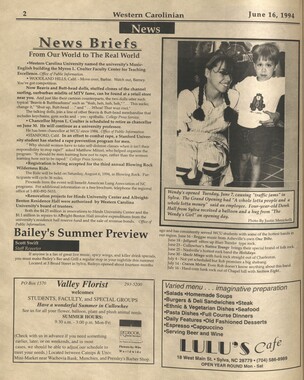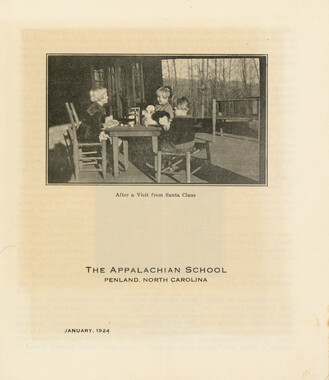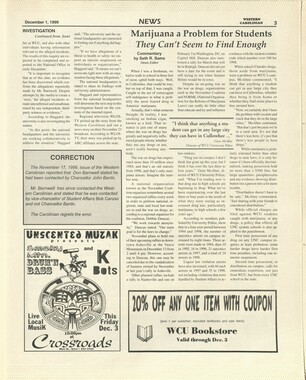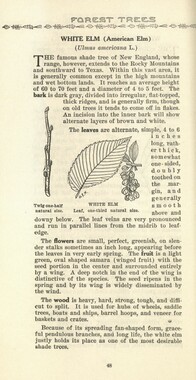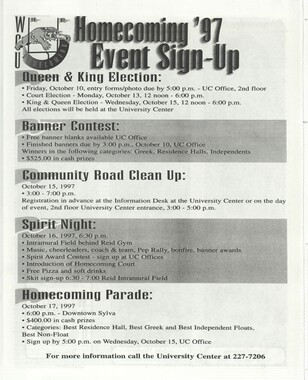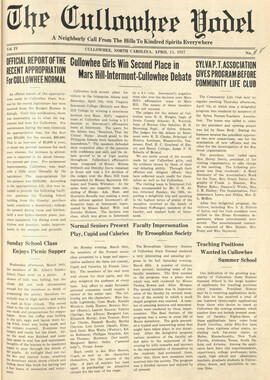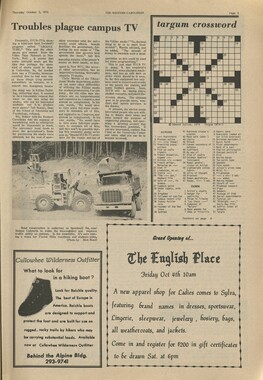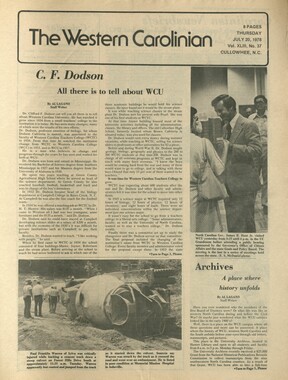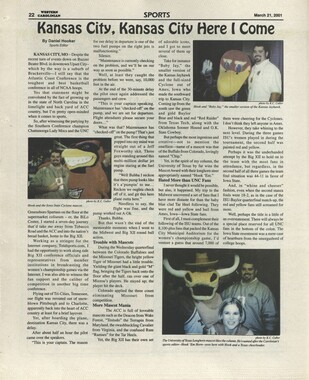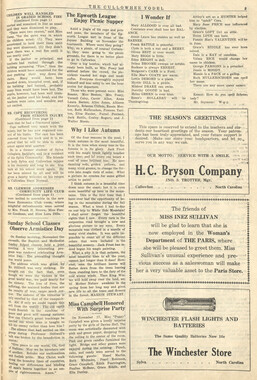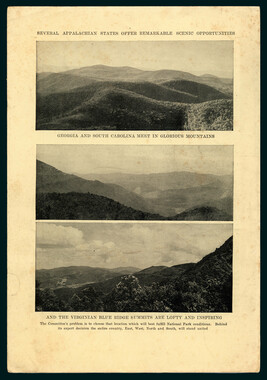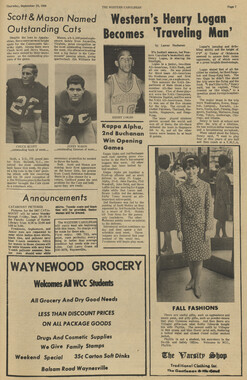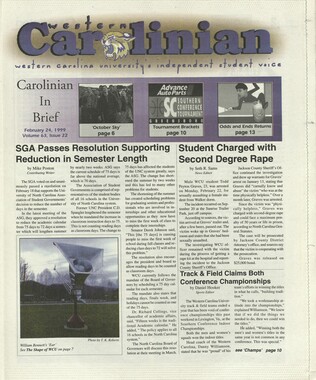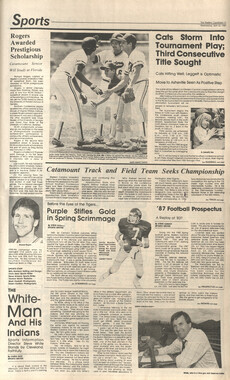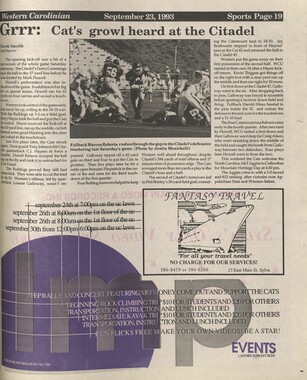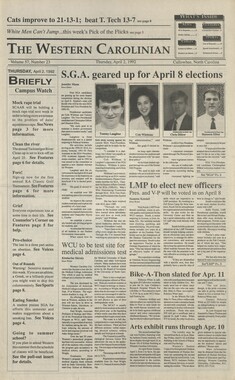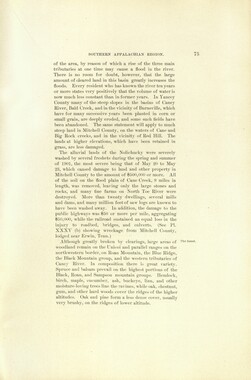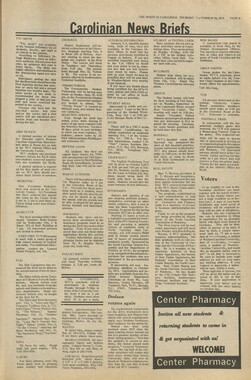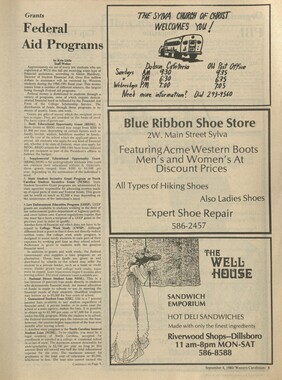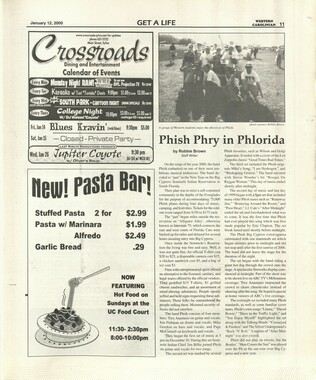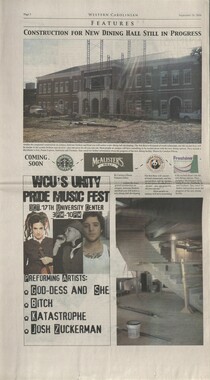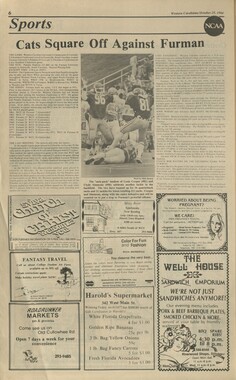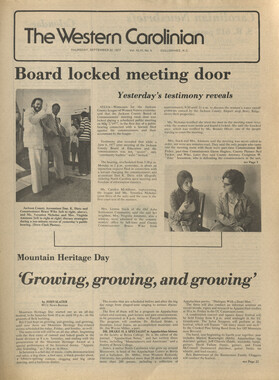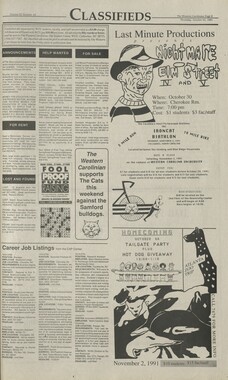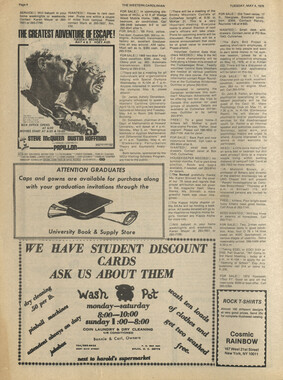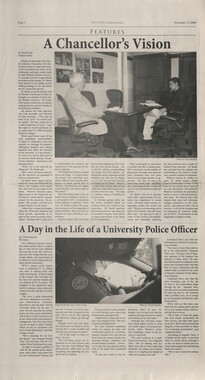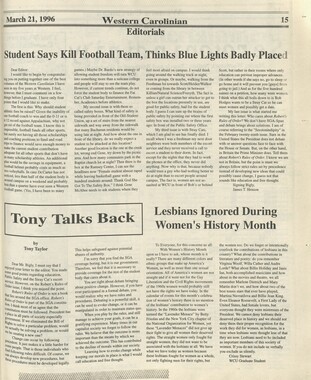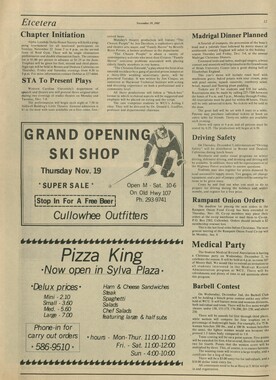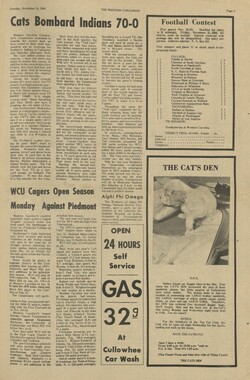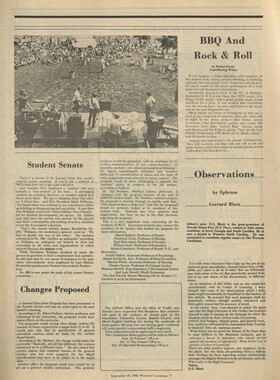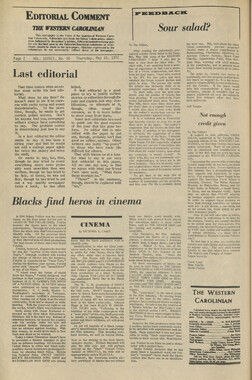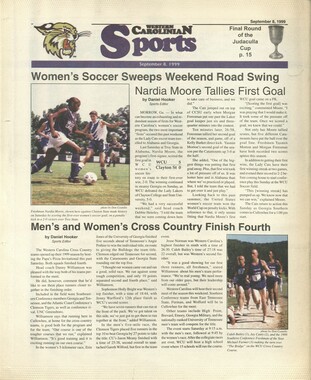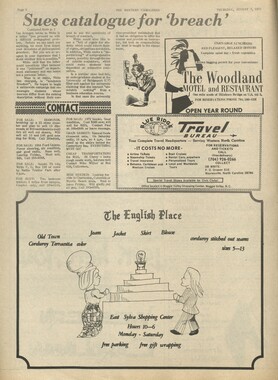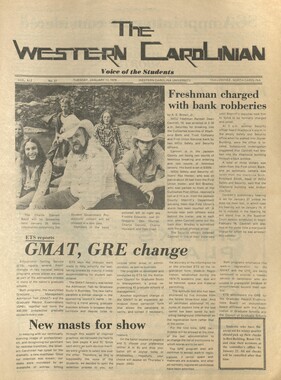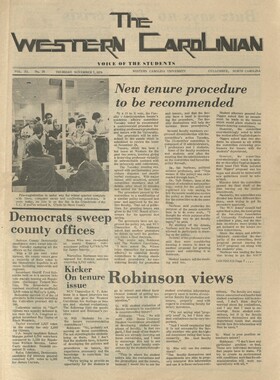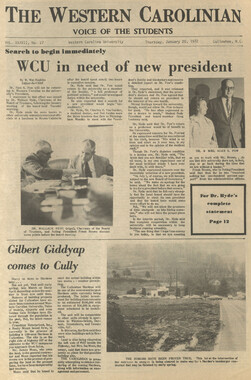Western Carolina University (20)
View all
- Canton Champion Fibre Company (2308)
- Cherokee Traditions (291)
- Civil War in Southern Appalachia (165)
- Craft Revival (1942)
- Great Smoky Mountains - A Park for America (2946)
- Highlights from Western Carolina University (430)
- Horace Kephart (941)
- Journeys Through Jackson (159)
- LGBTQIA+ Archive of Jackson County (85)
- Oral Histories of Western North Carolina (314)
- Picturing Appalachia (6798)
- Stories of Mountain Folk (413)
- Travel Western North Carolina (160)
- Western Carolina University Fine Art Museum Vitreograph Collection (129)
- Western Carolina University Herbarium (92)
- Western Carolina University: Making Memories (708)
- Western Carolina University Publications (2412)
- Western Carolina University Restricted Electronic Theses and Dissertations (146)
- Western North Carolina Regional Maps (71)
- World War II in Southern Appalachia (131)
University of North Carolina Asheville (6)
View all
- Allanstand Cottage Industries (62)
- Appalachian National Park Association (53)
- Bennett, Kelly, 1890-1974 (1388)
- Berry, Walter (76)
- Brasstown Carvers (40)
- Carver, George Washington, 1864?-1943 (26)
- Cathey, Joseph, 1803-1874 (1)
- Champion Fibre Company (233)
- Champion Paper and Fibre Company (297)
- Cherokee Indian Fair Association (16)
- Cherokee Language Program (22)
- Crowe, Amanda (40)
- Edmonston, Thomas Benton, 1842-1907 (7)
- Ensley, A. L. (Abraham Lincoln), 1865-1948 (275)
- Fromer, Irving Rhodes, 1913-1994 (70)
- George Butz (BFS 1907) (46)
- Goodrich, Frances Louisa (120)
- Grant, George Alexander, 1891-1964 (96)
- Heard, Marian Gladys (60)
- Kephart, Calvin, 1883-1969 (15)
- Kephart, Horace, 1862-1931 (313)
- Kephart, Laura, 1862-1954 (39)
- Laney, Gideon Thomas, 1889-1976 (439)
- Masa, George, 1881-1933 (61)
- McElhinney, William Julian, 1896-1953 (44)
- Niggli, Josephina, 1910-1983 (10)
- North Carolina Park Commission (105)
- Osborne, Kezia Stradley (9)
- Owens, Samuel Robert, 1918-1995 (11)
- Penland Weavers and Potters (36)
- Roberts, Vivienne (15)
- Roth, Albert, 1890-1974 (142)
- Schenck, Carl Alwin, 1868-1955 (1)
- Sherrill's Photography Studio (2565)
- Southern Highland Handicraft Guild (127)
- Southern Highlanders, Inc. (71)
- Stalcup, Jesse Bryson (46)
- Stearns, I. K. (213)
- Thompson, James Edward, 1880-1976 (226)
- United States. Indian Arts and Crafts Board (130)
- USFS (683)
- Vance, Zebulon Baird, 1830-1894 (1)
- Weaver, Zebulon, 1872-1948 (58)
- Western Carolina College (230)
- Western Carolina Teachers College (282)
- Western Carolina University (1899)
- Western Carolina University. Mountain Heritage Center (18)
- Whitman, Walt, 1819-1892 (10)
- Wilburn, Hiram Coleman, 1880-1967 (73)
- Williams, Isadora (3)
- Cain, Doreyl Ammons (0)
- Crittenden, Lorraine (0)
- Rhodes, Judy (0)
- Smith, Edward Clark (0)
- Appalachian Region, Southern (2569)
- Asheville (N.C.) (1923)
- Avery County (N.C.) (26)
- Blount County (Tenn.) (195)
- Buncombe County (N.C.) (1672)
- Cherokee County (N.C.) (283)
- Clay County (N.C.) (555)
- Graham County (N.C.) (233)
- Great Smoky Mountains National Park (N.C. and Tenn.) (519)
- Haywood County (N.C.) (3569)
- Henderson County (N.C.) (70)
- Jackson County (N.C.) (4804)
- Knox County (Tenn.) (35)
- Knoxville (Tenn.) (13)
- Lake Santeetlah (N.C.) (10)
- Macon County (N.C.) (420)
- Madison County (N.C.) (215)
- McDowell County (N.C.) (39)
- Mitchell County (N.C.) (132)
- Polk County (N.C.) (35)
- Qualla Boundary (981)
- Rutherford County (N.C.) (76)
- Swain County (N.C.) (2135)
- Transylvania County (N.C.) (270)
- Watauga County (N.C.) (12)
- Waynesville (N.C.) (86)
- Yancey County (N.C.) (72)
- Aerial Photographs (3)
- Aerial Views (60)
- Albums (books) (4)
- Articles (1)
- Artifacts (object Genre) (228)
- Bibliographies (1)
- Biography (general Genre) (2)
- Cards (information Artifacts) (38)
- Clippings (information Artifacts) (191)
- Copybooks (instructional Materials) (3)
- Crafts (art Genres) (622)
- Depictions (visual Works) (21)
- Design Drawings (1)
- Drawings (visual Works) (185)
- Envelopes (73)
- Exhibitions (events) (1)
- Facsimiles (reproductions) (1)
- Fiction (general Genre) (4)
- Financial Records (12)
- Fliers (printed Matter) (67)
- Glass Plate Negatives (381)
- Guidebooks (2)
- Internegatives (10)
- Interviews (815)
- Land Surveys (102)
- Letters (correspondence) (1013)
- Manuscripts (documents) (618)
- Maps (documents) (177)
- Memorandums (25)
- Minutes (administrative Records) (59)
- Negatives (photographs) (6015)
- Newsletters (1290)
- Newspapers (2)
- Notebooks (8)
- Occupation Currency (1)
- Paintings (visual Works) (1)
- Pen And Ink Drawings (1)
- Periodicals (193)
- Personal Narratives (10)
- Photographs (12976)
- Plans (maps) (1)
- Poetry (5)
- Portraits (4539)
- Postcards (329)
- Programs (documents) (151)
- Publications (documents) (2364)
- Questionnaires (65)
- Relief Prints (26)
- Sayings (literary Genre) (1)
- Scrapbooks (282)
- Sheet Music (2)
- Slides (photographs) (402)
- Songs (musical Compositions) (2)
- Sound Recordings (796)
- Specimens (92)
- Speeches (documents) (15)
- Tintypes (photographs) (8)
- Transcripts (322)
- Video Recordings (physical Artifacts) (23)
- Text Messages (0)
- A.L. Ensley Collection (275)
- Appalachian Industrial School Records (7)
- Appalachian National Park Association Records (336)
- Axley-Meroney Collection (2)
- Bayard Wootten Photograph Collection (20)
- Bethel Rural Community Organization Collection (7)
- Blumer Collection (5)
- C.W. Slagle Collection (20)
- Canton Area Historical Museum (2110)
- Carlos C. Campbell Collection (462)
- Cataloochee History Project (64)
- Cherokee Studies Collection (4)
- Daisy Dame Photograph Album (5)
- Daniel Boone VI Collection (1)
- Doris Ulmann Photograph Collection (112)
- Elizabeth H. Lasley Collection (1)
- Elizabeth Woolworth Szold Fleharty Collection (4)
- Frank Fry Collection (95)
- George Masa Collection (173)
- Gideon Laney Collection (452)
- Hazel Scarborough Collection (2)
- Hiram C. Wilburn Papers (28)
- Historic Photographs Collection (236)
- Horace Kephart Collection (861)
- Humbard Collection (33)
- Hunter and Weaver Families Collection (1)
- I. D. Blumenthal Collection (4)
- Isadora Williams Collection (4)
- Jesse Bryson Stalcup Collection (47)
- Jim Thompson Collection (224)
- John B. Battle Collection (7)
- John C. Campbell Folk School Records (80)
- John Parris Collection (6)
- Judaculla Rock project (2)
- Kelly Bennett Collection (1407)
- Love Family Papers (11)
- Major Wiley Parris Civil War Letters (3)
- Map Collection (12)
- McFee-Misemer Civil War Letters (34)
- Mountain Heritage Center Collection (4)
- Norburn - Robertson - Thomson Families Collection (44)
- Pauline Hood Collection (7)
- Pre-Guild Collection (2)
- Qualla Arts and Crafts Mutual Collection (12)
- R.A. Romanes Collection (681)
- Rosser H. Taylor Collection (1)
- Samuel Robert Owens Collection (94)
- Sara Madison Collection (144)
- Sherrill Studio Photo Collection (2558)
- Smoky Mountains Hiking Club Collection (616)
- Stories of Mountain Folk - Radio Programs (374)
- The Reporter, Western Carolina University (510)
- Venoy and Elizabeth Reed Collection (16)
- WCU Gender and Sexuality Oral History Project (32)
- WCU Mountain Heritage Center Oral Histories (25)
- WCU Oral History Collection - Mountain People, Mountain Lives (71)
- WCU Students Newspapers Collection (1843)
- Western North Carolina Tomorrow Black Oral History Project (69)
- William Williams Stringfield Collection (2)
- Zebulon Weaver Collection (109)
- African Americans (390)
- Appalachian Trail (35)
- Artisans (521)
- Cherokee art (84)
- Cherokee artists -- North Carolina (10)
- Cherokee language (21)
- Cherokee pottery (101)
- Cherokee women (208)
- Church buildings (172)
- Civilian Conservation Corps (U.S.) (111)
- College student newspapers and periodicals (1933)
- Dams (107)
- Dance (1023)
- Education (222)
- Floods (61)
- Folk music (1015)
- Forced removal, 1813-1903 (2)
- Forest conservation (220)
- Forests and forestry (1184)
- Gender nonconformity (4)
- Great Smoky Mountains National Park (N.C. and Tenn.) (181)
- Hunting (45)
- Landscape photography (25)
- Logging (119)
- Maps (83)
- Mines and mineral resources (8)
- North Carolina -- Maps (18)
- Paper industry (38)
- Postcards (255)
- Pottery (135)
- Railroad trains (72)
- Rural electrification -- North Carolina, Western (3)
- School integration -- Southern States (2)
- Segregation -- North Carolina, Western (5)
- Slavery (5)
- Sports (452)
- Storytelling (243)
- Waterfalls -- Great Smoky Mountains (N.C. and Tenn.) (66)
- Weaving -- Appalachian Region, Southern (280)
- Wood-carving -- Appalachian Region, Southern (328)
- World War, 1939-1945 (173)
Western Carolinian Volume 13 Number 08
Item
Item’s are ‘child’ level descriptions to ‘parent’ objects, (e.g. one page of a whole book).
-
-
Student Owned THE WESTERN CAROUNIAN Student Controlled Vol. XIII; No. 8 CULLOWHEE, N. C, FRIDAY, MARCH 29, 1946 Published By The Student Association Charles Winthrop Copp Speaks On 'Revamping Japan'; Lauds Beauty Of Oriental Country People Accepted Christianity Outwardly In Order To Obtain Fire Arms. Japan is easily one of the most beautiful countries on earth, asserted Charles W. Copp, an English teacher in Japanese schools for 21 years, who spoke in Moore Parlors Friday, March 22. He added that Sylva was more like Japan than any place he had visited in the United States. "I think of Japan as a paradise on earth," Mr. Copp said. He spoke before a group of faculty members and students on "Revamping Japan." He has been in daily contact with the Japanese people, was a prisoner of the imperial government, and was returned to the United States on the exchange ship, "Gripsholm." In a short sketch of the history of Japan, Copp mentioned that it was discovered in 1542. In 1549 the first missionary came and brought with him the first guns. There had been constant internal warfare and the Japanese were willing to accept Christianity, at least outwardly, in order to obtain firearms and munitions. In the next half century about 300,000 people were converted. In 1600 a Spanish ship put into a Japanese port. The captain told some officers that Spain increased her colonies by first sending missionaries into the country to be conquered. From that day missionaries and converts were persecuted in Japan and in 1640 a government document proclaimed that any Christian who dared visit Japan would be killed. Hermit Nation 250 Years "For 250 years it was a hermit nation," Mr. Copp continued. The government was totalitarian. There were four classes of people, ranked in order of respect (1) the warriors (2) the farmers (3) the artisans (4) the merchants. In 1853 Admiral Perry of the United States opened the doors of Japan for trade, Mr. Copp reminded his audience. Then the country began to take a part in world affairs. "The Japanese schools are good," the lecturer said. Ninety- nine per cent of the children attended school for six years. Only a ve~y few attended the universities, however. They believe in higher education for only the best. Mr. Copp spoke of the imperial family, which has no name but is supposed to be descended from the sun goddess and therefore divine. There are two kinds of Shintoism, he added: (1) primitive Shintoism, and (2) state Shintoism, which ' says Japan should rule the world. It has only been in the 20th century that state Shintoism has become the creed of the Japanese. Jap Aggression Explained Land hunger and an over-crowded population caused the war, Mr. Copp added. Eighty million people are living in an area the size of Montana. He emphasized that this did not excuse their aggressiveness, but it explained it. Japan is bitter about the exclusion of orientals from white lands, the lecturer remarked. He said, "The Exclusion Act killed every liberal movement in Japan." To sell Japan islands in the Pacific like Borneo and to educate them for birth control is the only solution to the land problem unless we exterminate them, Mr. Copp declared. "It is not only our duty but commonsense that we co-operate with any international or —Turn To Page Three "Harriet" Is Well Received By Large Audience March 1 The Western Carolina Players did it again March 1, when they presented their winter production, "Harriet," before a capacity audience. An unofficial report has credited the play with drawing the largest crowd to a campus function where admission was charged in the history of the College. The play was a production headache: scenery, costumes, a large cast; acting which would task professionals. Miss Mabel Tyree, director, and members of the Players, took what seemed to be an impossible job and presented the audience with three hours of entertainment, filled with laughs and tears. Margaret Young held the leading role in the 3-act play, written by Florence Ryerson and Colin Clements, which portrays the life of Harriet Beecher Stowe. She gave a beautiful performance with a tender and vivid interpretation of the little woman who "caused the war." This was Miss Young's fourth role since she joined the Players last year. She had parts in "Skin of Our Teeth," "Ring Around Elizabeth" and "Kiss and Tell." Harriet's husband, Calvin Stowe, the absent-minded profesor who gave his bride a picture of his first wife as a wedding present and carried his shoes in the pockets of his coat, was played by Warren Barnes. Barnes, president of the W. C. Players, had roles in "Ring Around Elizabeth" and "Kiss and Tell." Grew Up In Three Hours Don Cabe, as Henry Ward Beecher, did a marvelous job of growing up in three hours from a moody idealistic boy who ridiculed the Beecher clan, to a pompous convention-ridden minister who used the pulpit as a stage for his publicity stunts. Cabe is a pre-war member of the club who is back again. Catherine Beecher, a blue-stocking of the period, was always fighting for something all the way from better puddings to woman —Turn To Page Two Interest Added To Assembly Program By Music Dept. When the Music Department is; in charge of the program, assem-1 bly is always interesting. Voice, violin and piano students and the chorus participated in a recital, presented March 7 in the Hoey Auditorium. Mrs. Inez Gulley is in structor in voice; Mr. Nelson O. Schreiber, instructor in violin; and Mr. A. M. White, instructor in piano. Betty Jean Ashbrook played "Passepied" by Bach. Ruth Hooper played "Serenade" by Drdla, and Edward Sutton played "Tobag- gan Ride" by Arnold. Of the voice students, Clara Padgett sang "By the Bend of the River;" Maxine Barbour, "A Dream;" Mary Joyce Calvin, "Auf dem Wasser zu singer;" Betty McMahan, "Song of the Robin;-' Christine Aycock, "Love Went A Riding;" Jean Young, "A Heart That's Free;" Monte Haire, "Danny Deever;" Margaret Rhodes, "Chanson Provencale." Sadie Wallin played "Etude" by Heller and Daphne Goodman played Beethoven's Sontata in C Minor, Opus 13, Grave-Allegro. Margaret Rhodes, Christine Aycock and Monte Haire sang "Oh, Promise Me" by De Koven. The program was closed by the chorus singing, "Listen to the Lambs." Spoke On Japan Elected Director N. C. Music Festival Assn. Four Reports About Enlarging Curriculum Given By Teachers Mrs. Gulley Attends National Convention 29 New Veterans Register For Quarter Twenty-nine new veterans, who have been former students here, registered for the spring quarter, 1946, according to Miss Addie Beam, registrar. The following were registered by March 25: Lane Arrington, Ben Battle, Max Gantt Beam, William Buckner, Russell Byrd, Walter Jackson Carpenter, Clarence Cook, John Crawford, Cornelius Deitz, John Eddins, Howard Edgerton, Samuel Gibson, James A. Harris, Alonzo Lyle Jones, Edward Coleman Jones, Harest King, Ruth Lee, Elmer Neill, James Vernon Painter. Ernest Jake Phillips, Perry Plemons, Frank Plyler, Benjamin Price, John Siler, Garmon Smith, Paul A. Sutton and Walter Warren. Mrs. Charles G. Gulley left Sunday, March 24, for Cleveland, Ohio, where she attended the Music Educators' National convention which convened in that city March 26 and continued one week. The event was held in cooperation with the Cleveland Sesquicenten- nial Commission, Inc., and commemorated 100 years of music teaching in the schools of Cleveland. Five thousand musicians and educators from United States, Canada, Mexico, Central and South America attended. The Ohio Music Education Association presented a music festival one day which included a massed chorus of 2,000 voices and an orchestra of 700 players. Cleveland schools held open house and the conference members were shown the music program in its entirety. While in Cleveland Mrs. Gulley was the guest of her sister, Mrs. Theo W. Risebrook of 3333 Euclid Avenue, herself a professional accompanist. Mrs. Charles G. Gulley, assistant professor in music of this college, has been elected as one of the directors of the North Caro Una Music Festival Association or ganized in Raleigh recently. The aims of this new organization as stated by the preamble to its constitution are: "To advance the ideals, interest and practical ministrations of opera, oratorio, symphonic and orchestral music, throughout North Carolina; to foster the composition, production and appreciation of such music throughout the said terr* tory as valuable forms of musical expression and musical art; to further cooperation between ex isting centers of musical activity and to encourage the formation and growth either under its own auspices or independent thereof, of new centers of production throughout the State." Mrs. Gulley, who has been in charge of voice at this institution for a number of years, is prominent in music and club circles throughout the state. In addition to her teaching duties on this campus, she is director of the choir at the Sylva Methodist church. A native of Vermont and for more than 20 years a teacher in the Japanese school system, Mr. Copp was the lyceum speaker for the month of March. His subject was "Revamping Japan." Miss Albright Attends Meeting In Atlanta Miss Anne Albright, dean of Women at Western Carolina Teachers College, and Dr. C. D. Killian attended the Southern Regional Conference in Atlanta, March 14- 16. Miss Albright who attended all of the speeches, even the dull ones, reported she heard talk at the conference of the veterans pushing the co-eds out of the colleges; but she says, "I'm not worried." A plan for a Committee Counseling program was the theme of the conference. All organizations present discussed the plan which had been worked out in advance by a committee representing all the groups. After they had discussed the plan the results were mimeographed and handed out at the last meeting. It was adopted after further discussion. The gist of the program is that every community not already doing so establish a community center at which trained and capable people hold regular office hours for the purpose of giving expert council to those who feel the need of discussing their problems with intelligent and sympathetic people, Miss Albright said. Harry J. Jager, Chief of the Occupation Information and Guidance Service and U. S. Education, at Washington, D. C, was at the conference. Other organizations represented at the meeting were the National Vocational Guidance Association, the National Federation of Business and the National Association of the Deans of Women. Central Committee To Arrange Festival Katherine Powell and Nancy Blanton have been named co-chairmen of the central committee for May Day. The committee is made up of representatives from the Day Students' Association, Men's House Government, Woman's House Government and the Physical Education department. Dean Anne Albright is also a member of the committee. Dorothy Tilley and Bob Claxton represent the day students; Jim Russell and Carl Painter, Men's House Government; Delite Kirk, Woman's House Government; and Helen Hartshorn and Miss Benton, the P. E. department. The central committee will be in charge of all arrangements for the May Day festival. They will be assisted by sub-committees. Miller Elected Head Alpha Tau Kappa McDonald Says Campus Should Become Garden Spot Among N. C. Mountains Western Carolina Teachers College should become a garden spot among the mountains of North Carolina, said O. R. McDonald, president of the student body in a recent interview. He pictured the campus with carefully tended lawns and well-kept shrubbery, emphasizing what a contrast it would be to the rugged scenery surrounding it. "Pete," the lanky boy from Kansas, has an adopted love for Western North Carolina, and particular for Cullowhee, greater than that of many students whose homes are here. He has encouraged better care for the campus both as a member of the Pre-Se,:sion Conference last fall and as President of the Marshals* Club. The marshals have sponsored a cleanup drive, particularly of waste paper on the grounds. "I think there is a crying need for landscaping, on 'school house hill'," added McDonald. Places he mentioned especially as sore spots are the section between Moore and the gymnasium; the red clay bank, approaching from the power house to Madison Hall; the grounds around Davies Hall; and the slope leading from the classroom building to Joyner. More Shrubbery Needed He , uggested tha* more hrub- —-Turn To "age Three AlpTia Tau Kappa, recently organized forensic fraternity on the campus, elected N. A. Miller, president at its last meeting. Nancy Potts, sophomore, was elected secretary. N. A. Miller, Brevard, is a veteran of the Army air coprs. A former Mars Hill student, he was president of one of the prominent literary societies on the campus. Nancy Potts, daughter of Frank Potts, of Highlands, is a sophomore. She is president of the Wesley Club and on the Western Carolinian staff. At the meeting the Alpha Tau Kappa constitution was read, amended, and adopted. Members attending were N. A. Miller, Nancy Potts, Toot Hannah, Terry Phillips, Jim Russell, L. H. Halliburton, Orville Coward. The fraternity meets e v e t y other Tuesday night at 8:15. John Worth McDevitt is faculty sponsor. Four reports at faculty meetings by the heads of various departments recently have centered on expansion of the college curriculum to better meet the educational needs of students in this area. Department heads who have presented expansion plans are A. K. Hinds, mathematics; Charlotte Watson, art; Mildred Roberts, home economics; Nelson Schreiber, music. In the field of mathematics Professor Hinds recommended that requirements for a major be raised to 39 quarter hours and for a minor to 30 hours. Present requirements call for 36 and 27 hours respectively. For students deficient in arithmetic, algebra and geometry, Professor Hinds recommended that they be required to take "contract courses" in these subjects. Contract courses would carry three hours' credit and all the time necessary for the student to finish this work. He would not, however, be admitted to more advanced courses until he had passed the examinations in the contract courses. More Hours Proposed In Home Ec Miss Mildred Roberts reported that of the 42 required hours for a degree in home economics this institution now offers 23, leaving only 19 hours to be provided. She recommended that six hours in foods, six in clothing, three in home management and four and ene-half in child development be added to the present offerings to make this degree possible. The cottage occupied by the Steadman Mitchells, manager of the college farm, Miss Roberts said, could be furnished as a practice house and provide training for 36 majors each year. The West- inghouse people, she said, offers to provide equipment for such projects at half-price and keep it conditioned. One full-time faculty member, Miss Roberts thinks, could take care of the entire department needs easily until it grows somewhat. At present one person teaches home economics in both the college and Training School. This year 26 college students are enrolled in home economics. In the past two years 19 majors and 50 non-majors have taken courses in this department. Miss Watson Recommends Art Major Miss Watson outlined requirements for a major in art that could be handled by two faculty members for a student body of 500 members. Based on the James E. Hillman report for certifications of teachers, she would require 48 hours of work for a major. Fifteen of these should be in the field of design; 15 in drawing and paint ing; 6 in ceramics and 12 in art history. She would also require eleven hours in general art and in crafts and six hours in art education. These courses would also —Torn To Page Two N. C Little Symphony Given Ovation At Appearance Here "Deep Forest" Most Colorful Memorial Stadium Committees Named; Sutton Is Chairman 'Cripple Creek," By Lamar Stringfield, Reminiscent Of Mountain Music OLSON IS SELECTED ON STATE BASKETBALL TEAM HOUSING UNITS ARE SECURED BY W.C.T.C. Ralph C. Sutton, business manager of the college, has been named chairman of the Memorial Stadium committee, according to President H. T. Hunter. Miss Alice Benton, physical education director, was elected secretary and R. L. Ariail, cashier of the Jackson county bank, treasurer. Other members of the committee are Dean W. E. Bird, President H. T. Hunter, John W. McDevitt Prof. C. F. Dodson, Coach Marion McDonald, H. E. Buchanan and Coach Tom Young. Forty thousand dollars is the goal set for the stadium, to be erected in honor of students who died in the recent war. So far, members of the faculty have pledged $3,000. The student donations are progressing satisfactorily, President Hunter said. To represent the whole of North Carolina, the board of trustees, alumni, citizens and the student body, an advisory committee has also been appointed. D. Hiden Ramsey, business manager of the Asheville Citizen-Times was elected chairman. Other members of the committee are Reuben B. Robertson, Flat Rock; Dr. Ralph Jar rett, Charlotte; Joseph Dave, Asheville; Joseph S. Silversteen, Brevard; T. C. Roberson, Asheville; E. L. McKee, Sylva; S. W. Enloe, Dillsboro; Jonathan Woody, Waynesville; Thelma Galloway, Brevard; Jeanette Moore, Sylva; H. E. Battle, Cullowhee; Charles Morgan, Asheville; Carl Ratcliffe, Waynesville; Richard Queen, Asheville; Horace Meredith, Guilford College. Jerry Rice, Marshall; Margaret1 Young, Stovall; C. A. Dandelake, Raleigh; Lt. Col. George Cox, Cullowhee; J. Walter Moore, Waynesville; Mrs. R. B. Slaughter, Robinson; Mai Wall, Shelby; Senator Lee B. Weathers, Shelby; Walter B. Thomas, Hiawassee; Ed Carpenter, Franklin; Hubert Justice, Burnsville; Mrs. Winston Felts, Spruce Pine; Mrs. Kealy Bennett, Bryson City; and the following members of the board of trustees: H. E. Buchanan, Hendersonville; Buech Murphy; Ed B. Whitaker, Bryson City; R. S. Jones, Franklin; Dan M. Allison, Sylva; Mrs. J. S. Silversteen, Brevard; Glen W. Palmer, Clyde; and Morgan Cooper, Forest City. According to President Hunter, this is the first time in the history of the college that we have asked the public for any large sum. "And we intend to push the campaign into a large territory," he stated. During W. C. T. C.'s 57 years of history, Dr. Hunter estimated that the total gifts to the college would not exceed $20,000. Western Carolina Teachers College has been allotted 20 temporary dwelling units by the National Public Housing administration. The college was at first allotted five, but this quota was later increased to 20. The National Public Housing administration has awarded 333 ex tra temporary dwelling units to North Carolina schools and municipalities raising to 1,368 the number allotted to the state lo help relieve the housing crisis. The units will be located in a group forming a "village" somewhere near. TURNER RETURNS TO DUTIES ON CULLOWHEE FACULTY W. Newton Turner, associate professor of Geography and Geology at Western Carolina Teachers College, has returned to Cullowhee after almost two years in the navy. He resumed his teaching duties here this quarter. Entering the navy in March 1944, Turner attained the rank of Lieutenant (j.g.) He was stationed in Pearl Harbor for some time. Mr. and Mrs. Turner are residing at their home in Cullowhee. They have one daughter, Susan, 5. Claire (Ikey) Olson, star of last season's high flying Western Carolina Teachers' College basketball team, was selected as forward on the second All North State Conference basketball team at the close of the season last month. Olson, playing for his third year here, was one of the Catamount's most valuable players. Prior to his return to W.C.T.C. from the navy, Olson was regular forward on the NATJTC Skyjacket basketball team for two years. While Olson was a member, the Skyjackets rang up 39 victories while dropping five, won the Oklahoma State Service League championship last year and were undefeated in the ten games the?' had played up to the time Olson w?s discharged this year. Tournament Planned For April 5-6 Cancelled For Lack Of Dorm Space The North Carolina Little Symphony received the ovation of a spring prom Monday night, March 25th, when it performed in the Hoey auditorium. Students, faculty and citizens of Jackson county flocked to hear the "first state symphony" conducted by Benjamin Swalin of the University ot North Carolina. Concerts, especially symphony- concerts, are 'a phenomena on the. W.C.T.C. campus as well as in Jackson county. Some sat in awe- of it all, others pretended deep understanding and others understood. Regardless of the feeling in the audience, the symphony was thoroughly enjoyed. Perhaps the most colorful and exacting number on the program was "Deep Forest" by Mabel Daniels, graduate of Radcliff college. Unfortunately, the audience did not applaud and Mr. Swalin is still probably wondering why. Students were partial to "Deep Purple" by Peter DeRost arranged by Mr. Swalin and "Child's Play" by Stix-Ormandy. The latter was played entirely by the string section without the use of bows. It was delightfully entertaining. Schubert's Symphony No. 5 in B-Flat Minor, consisting ol flour major movements: Allegro, Andante con moto, Minuette, (Allegro Molto) and Allegro Vivace, proved that the Symphony is no longer floundering but has definitely made a toe-hole in the climb to success. Under the dynamic direction of Mr. Swalin, the personnel presented a powerful interpretation of one of Schubert's greatest works. Maxine Swalin, wife of the conductor and pianist in the symphony, and Charles Medlin, violin- cello, made a duet of "Apres Un Reve (After a Dream) by Faure, demonstrating Mrs. Swalin's prowess at the piano and Mr. Medlin's "at home" feeling with the violin- cello. Mr. Swalin walked straight into the hearts of everyone when he announced the waltz, "Vienna Life" by Strauss, composer of the world-famous "Blue Danube." He- explained that the waltz was the dance of the 19th century and: that "It was the first time a man was authorized to put his arm around a lady in public." "Romance," by Wieniawski, was typical of the romantic element. A thunder of applause brought the conductor on the stage twice at the end of the program and finally for an encore. "Cripple Creek," an old mountain folk song arranged by Lamar Stringfield, was reminiscent of the mountain music language. He was called, to the stage again, but deferred another encore. The story of the North Carolina symphony is one of a few ardent music lovers who determined in 1930 to found a state symphony. Helped by the WPA and then by an appropriation from the state, it became recognized as a fundamental institution and the musicians are at last on a salary. Theirs is not an easy goal. They aim to give education and culture to the people of North Carolina—not the everyday type nor the "long hair" variety, but a program of genuine interest to the folks of the state. In doing so, they hope to first help the people to understand a»d then appreciate good music. Nelson O. Schreiber, violin in- —Turn To Page Three Because of limited dormitory space, members of the college administration have cancelled the annual dramatics tournament originally planned for April 5-6. Besides an unusually large registration of new and former students this quarter, the Veterans' administration asked the college to take two units of refresher men. Approximately 130 persons, rep- i resenting 13 high schools, wert j listed to be guests of the collegi ' for two days. Although the Western Carolina Players, sponsors of | the tournament agreed to 1. ke i over extra wo k, tliore was an ,v sufficient amount of blankets, sheets, silver and china. With the largest registration in several years, the college is under a strain to care for its own students. Miss Florence Mims and two dramatic students of Winthrop college were to have been the critic judges. Series of 1-act plays would have been entered in the contest, the first planned in four years. High schools who had indicated their intentions of entering the contest were: Fassifern School for girls, Biltmore, Oak Hill, Kings Creek, Bethel, Canton, Weaver- ville, Glenville, Cullowhee, Brevard r.nd Marion. J. R. Jarrett Is Guest At Chapel Mr. J. R. Jarrett, Dillsboro, proprietor of the Jarrett-Springs hotel, was in charge of the assembly March 19 in the Hoey Auditorium. A well-known poet and composer, Mr. Jarrett read "Okeeneechee," an original poem about the Cherokee Indians and "The Lake of Forgetfulness." Accompanied by Mrs. Inez G. Gulley, Mr. Jarrett sang "A Little Gray House in the Hills," which he had composed. Besides being a poet and composer of ballads, Mr. Jarrett has been a candidate several times for political offices. One of his sons, Dr. Ralph Jarrett, Charlotte, is a former student of Western Carolina Teachers College.
Object
Object’s are ‘parent’ level descriptions to ‘children’ items, (e.g. a book with pages).
-
The Western Carolinian is Western Carolina University’s student-run newspaper. The paper was published as the Cullowhee Yodel from 1924 to 1931 before changing its name to The Western Carolinian in 1933.
-
